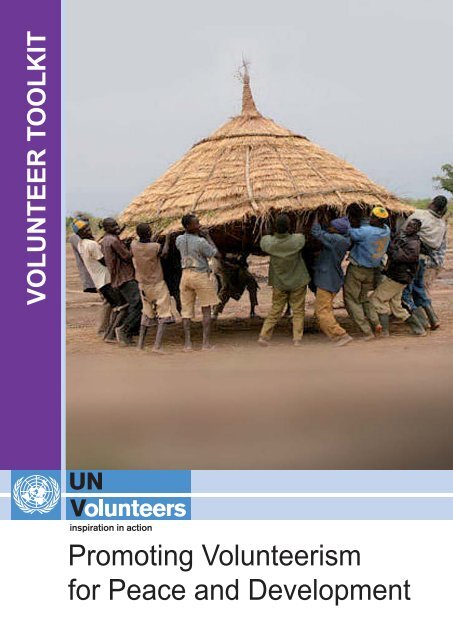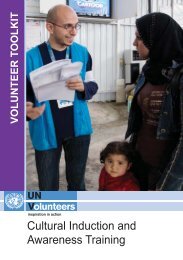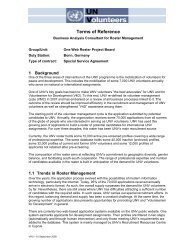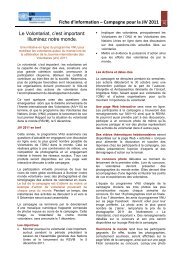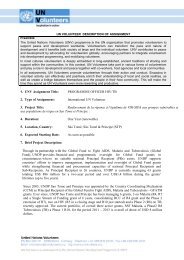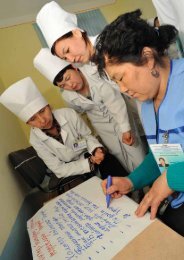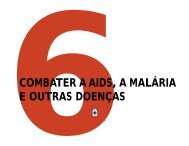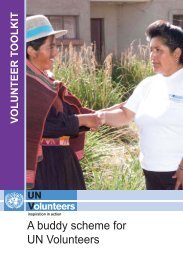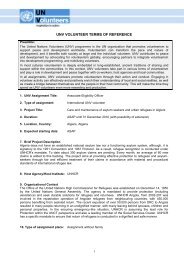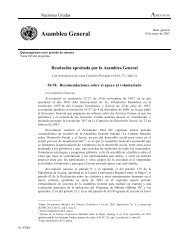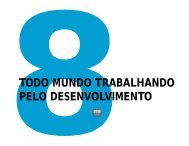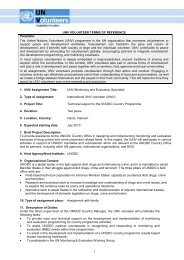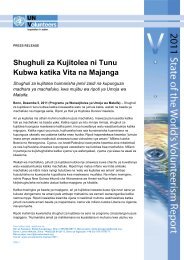Promoting Volunteerism for Peace and Development
Promoting Volunteerism for Peace and Development
Promoting Volunteerism for Peace and Development
- No tags were found...
Create successful ePaper yourself
Turn your PDF publications into a flip-book with our unique Google optimized e-Paper software.
VOLUNTEER TOOLKITYOUR ASSIGNMENT AS A UN VOLUNTEER . 1<strong>Promoting</strong> <strong>Volunteerism</strong><strong>for</strong> <strong>Peace</strong> <strong>and</strong> <strong>Development</strong>
ForewordThe <strong>Promoting</strong> <strong>Volunteerism</strong> <strong>for</strong> <strong>Peace</strong> <strong>and</strong> <strong>Development</strong>: is apractical guidance <strong>for</strong> UN Volunteers on how to give expression to<strong>Volunteerism</strong> <strong>for</strong> <strong>Peace</strong> <strong>and</strong> <strong>Development</strong> during their UN Volunteerassignment <strong>and</strong> beyond. The tool is part of a Volunteer Toolkit, whichcontains eight (8) volunteer management tools: The Volunteer Toolkithas been developed to support the implementation of UNV ProgrammeStrategy 2011- 2013, more specifically to enhance the effectiveness ofvolunteer management <strong>and</strong> the skills of UN Volunteers to become goodadvocates of <strong>Volunteerism</strong> <strong>for</strong> <strong>Peace</strong> <strong>and</strong> <strong>Development</strong>.The Volunteer Toolkit is to be disseminated <strong>and</strong>/or made available to UNVolunteers over the course of their volunteer assignment. The objectiveis to ensure that UN Volunteers (POs, other international UNVolunteers, <strong>and</strong> national UN Volunteers) can benefit from each tool atthe relevant stage of their assignment: Pre-assignment; Support duringassignment <strong>and</strong> End of Assignment.Front Cover: Volunteers in Burkina Faso demonstrate traditional solidarity
CONTENTS . 1TABLE OF CONTENTSIntroduction. . . . . . . . . . . . . . . . . . . . . . . 00<strong>Volunteerism</strong> <strong>for</strong> peace <strong>and</strong>development. . . . . . . . . . . . . . . . . . . . . 00What is volunteerism <strong>for</strong> peace <strong>and</strong>development? . . . . . . . . . . . . . . . . . . . . 00UNV <strong>and</strong> volunteerism <strong>for</strong> peace <strong>and</strong>development. . . . . . . . . . . . . . . . . . . . . . 00What does it mean to volunteer?. . . . . . . 00Prior to your assignment . . . . . . . . . . . 00<strong>Volunteerism</strong> <strong>for</strong> peace <strong>and</strong>development in your descriptionof assignment. . . . . . . . . . . . . . . . . . . . . 00Preparatory <strong>and</strong> ongoing reflectionon volunteerism <strong>for</strong> peace <strong>and</strong>development in your assignment . . . . . 00During your assignment . . . . . . . . . . . . 00Useful concepts <strong>and</strong> approaches tovolunteerism <strong>for</strong> peace <strong>and</strong>development. . . . . . . . . . . . . . . . . . . . . . 00‘Expertise‘ . . . . . . . . . . . . . . . . . . . . . . . 00A person-to-person approach. . . . . . . . 00Inclusiveness . . . . . . . . . . . . . . . . . . . . 00Gender . . . . . . . . . . . . . . . . . . . . . . . . . 00Building individual capacity . . . . . . . . . 00Transcending boundaries. . . . . . . . . . . 00Taking an inventory. . . . . . . . . . . . . . . . 00Mapping your environment. . . . . . . . . . 00Local traditions of volunteerism . . . . . . 00Sources of support <strong>for</strong> volunteerism . . 00Volunteer contributions. . . . . . . . . . . . . 00Implementing volunteerism <strong>for</strong>development throughout yourassignment. . . . . . . . . . . . . . . . . . . . . . . 00Building up organizational capacity . . . 00Sources of support <strong>for</strong> localvolunteer groups. . . . . . . . . . . . . . . . . 00The multiplier effect. . . . . . . . . . . . . . . . 00Public education <strong>and</strong> advocacy . . . . . . 00Innovation . . . . . . . . . . . . . . . . . . . . . . . 00Integrating volunteerism <strong>for</strong>development into different kinds ofUNV assignments . . . . . . . . . . . . . . . . . 00Assignments in emergency <strong>and</strong>rehabilitation situations. . . . . . . . . . . . 00Assignments with United Nationspeacekeeping, peace-building,political <strong>and</strong> electoral missions . . . . . 00Integrating volunteerism <strong>for</strong>development into the UNDP/UNVCountry Programme . . . . . . . . . . . . . . . 00Contribute your thoughts –as well as your photos . . . . . . . . . . . . 00Periodic reports. . . . . . . . . . . . . . . . . . . 00Networking . . . . . . . . . . . . . . . . . . . . . . 00International Volunteer Day . . . . . . . . . 00International Year of Volunteersplus Ten . . . . . . . . . . . . . . . . . . . . . . . 00After your assignment. . . . . . . . . . . . . . 00Debriefing <strong>and</strong> End-of-AssignmentReport. . . . . . . . . . . . . . . . . . . . . . . . . . . 00Keeping up-to-date. . . . . . . . . . . . . . . . . . 00Staying involved . . . . . . . . . . . . . . . . . . . . 00Advocating <strong>for</strong> volunteerism <strong>for</strong>development at home. . . . . . . . . . . . . . . . 00
2 . PROMOTING VOLUNTEERISM FOR PEACE AND DEVELOPMENTIntroductionIt is with great pleasure that I welcome youto the United Nations Volunteers (UNV)programme. When you receive this guide,you are one of almost 8000 UN Volunteersannually supporting peace <strong>and</strong>development worldwide. You are servingeither on an assignment in developmentcontributing to achieving the MDGs withUNDP or other UN agencies or in in apeacekeeping mission or a special politicalor peace-building mission, in humanitarianresponse or in an electoral operation.As a UN Volunteer you have theextraordinary opportunity to createbeneficial change <strong>and</strong> have a positiveimpact on people’s lives. Even if your UNVassignment is fairly short, you can have along-term impact <strong>and</strong> achieve a rippleeffect that extends far beyond theimmediate beneficiaries of youref<strong>for</strong>ts. Your actions can also inspire othersto volunteer <strong>and</strong> to believe that they toocan make a contribution towards peace<strong>and</strong> development. Ultimately, ifdevelopment is to be effective <strong>and</strong>sustainable, the people affected by it musttake ownership of its processes <strong>and</strong> drivethem <strong>for</strong>ward.The United Nations Volunteers (UNV)programme is the UN organization thatpromotes volunteerism to support peace<strong>and</strong> development <strong>and</strong> it benefits bothsociety at large <strong>and</strong> the individualvolunteer. UNV contributes to peace <strong>and</strong>development by advocating <strong>for</strong>volunteerism globally, encouragingpartners to integrate volunteerism intodevelopment programming, <strong>and</strong>mobilizing volunteers. These beliefsin<strong>for</strong>m the concept of volunteerism <strong>for</strong>peace <strong>and</strong> development, which is at thecore of UNV’s mission.The difference UNV makes is bydemonstrating peace <strong>and</strong> developmentresults <strong>and</strong> impact through volunteerism.UNV’s comparative advantage is theability <strong>and</strong> knowledge to bring abouttrans<strong>for</strong>mational change throughvolunteerism, community voluntary action<strong>and</strong> civic engagement through activepartnerships with civil society, volunteerinvolving organizations, UN agencies <strong>and</strong>Governments. This is inspiration in actionUN Volunteers come from 158 countries<strong>and</strong> many more cultural backgrounds, <strong>and</strong>thanks to this wide variety of perspectivesyou bring a range of experiences,expectations <strong>and</strong> approaches tovolunteerism <strong>for</strong> development. Thisdiversity gives volunteerism <strong>for</strong>development a particular dynamism.
INTRODUCTION . 3Your role as a UN Volunteer is that of bothfacilitator <strong>and</strong> catalyst. UNV encouragesyou to be creative <strong>and</strong> entrepreneurial infinding ways to develop capacity <strong>and</strong> topromote <strong>and</strong> foster volunteerism <strong>for</strong>development both within <strong>and</strong> beyond the<strong>for</strong>mal framework of your assignment.After all, there is no single ‘correct oroptimal way to volunteer <strong>for</strong> peace <strong>and</strong>development. By optimizing the impact ofvolunteerism, especially in terms ofdeveloping capacity, you can have a deep<strong>and</strong> long-lasting impact.Whether your service is in your owncountry or abroad, we believe that youhave chosen to be a UN Volunteerbecause you share the United Nations’commitment to development, humanrights <strong>and</strong> peace. All of these values havevolunteerism at their core. As a UNVolunteer, you are part of a cumulativeglobal ef<strong>for</strong>t – volunteerism – that is apowerful <strong>for</strong>ce <strong>for</strong> peace <strong>and</strong>development. Indeed, the Millennium<strong>Development</strong> Goals (MDGs) are onlyachievable if many millions of peoplearound the world voluntarily mobilize toattain them.personally give expression tovolunteerism <strong>for</strong> peace <strong>and</strong> developmentduring – <strong>and</strong> beyond – your UNVassignment. It draws on previousexperiences promoting <strong>and</strong> advocatingvolunteerism <strong>for</strong> peace <strong>and</strong> developmentin the field. Many UN Volunteers providedvaluable insights <strong>and</strong> practical advicebased on their personal experience inassignments around the world.This guide is intended to be a livingdocument that will be continually updatedbased on feedback from UN Volunteersso that it remains relevant. Yourcomments <strong>and</strong> suggestions will there<strong>for</strong>ebe greatly appreciated.I wish you a great assignment with manypositive results.Flavia PansieriExecutive CoordinatorUnited Nations VolunteersIn this h<strong>and</strong>book you will find practicaltools <strong>and</strong> some examples of how you can
4 . PROMOTING VOLUNTEERISM FOR PEACE AND DEVELOPMENT<strong>Volunteerism</strong> <strong>for</strong> <strong>Peace</strong> <strong>and</strong> <strong>Development</strong>What is volunteerism <strong>for</strong> peace <strong>and</strong>development?<strong>Volunteerism</strong> fosters empowerment <strong>and</strong>broad-based ownership, through whicheven the most disadvantaged groups cancontribute to more stable <strong>and</strong> cohesivecommunities. <strong>Volunteerism</strong> is both amanifestation <strong>and</strong> driver of social capital<strong>and</strong> civic participation, involving morepeople in the decisions that affect theirlives. In particular, it can helpdisadvantaged populations move frombeing passive recipients to becomingengaged actors in their own development.As a component of peace or developmentprogrammes, particularly at thecommunity level, volunteerism provides asense of belonging <strong>and</strong> ownership, puttingmarginalized communities at the centre oftheir reconciliation <strong>and</strong>/or developmentprocesses. It is also an important meansby which individuals gain the skillsnecessary to realize their economicpotential.Evidence shows that people in conflictenvironments have the will <strong>and</strong> instinct torespond with resilience <strong>and</strong>resourcefulness even in intense orprolonged conflicts. In fact, many of theconcepts related to peace making <strong>and</strong>peace building – from conflict prevention<strong>and</strong> reconciliation, to reintegration <strong>and</strong>reconstruction – are rooted involunteerism. Ongoing national <strong>and</strong>international conflicts continue to weakennational <strong>and</strong> individual resilience 1 .Nevertheless, emerging from within theseconflicts, volunteerism can serve as a keysource of reconciliation <strong>and</strong> reconstructionin divided societies.Volunteering has been a valuable partnerin a broad spectrum of peace <strong>and</strong>development activities, having as theiroverriding goal the eradication of poverty<strong>and</strong> the betterment of the humancondition. It is closely linked to achievingthe Millennium <strong>Development</strong> Goals(MDGs), where as of today, globalprogress in achieving MDG targets hasbeen slow. As indicated in UNDP’s MDGBreakthrough Strategy, <strong>and</strong> specificallythe MDG Acceleration Framework 2 ,strengthening participatory processes <strong>and</strong>building partnerships with civil society,which can be enhanced through1. OECD International Network on Conflict <strong>and</strong> Fragility.http://www.oecd.org/document/57/0,3343,en_2649_33693550_42113657_1_1_1_1,00.html2. Unlocking progress: MDG acceleration on the road to 2015:Lessons from the MDG Acceleration Framework pilot countries.September 2010, http://www.undp.org/mdg/acceleration.shtml
VOLUNTEERISM FOR PEACE AND DEVELOPMENT . 5volunteerism, are vital <strong>for</strong> achieving thesegoals. It is also widely recognized that topromote sustainable human development,peace is a prerequisite in that process.<strong>Volunteerism</strong> benefits society at large <strong>and</strong>the individual volunteer by strengtheningsolidarity <strong>and</strong> reciprocity among citizens.It can trans<strong>for</strong>m the pace <strong>and</strong> nature ofdevelopment <strong>and</strong> peace initiatives.“Many of the volunteers had no job, nomoney, had nothing to do all day…Through their voluntary work they wereable to increase their self-esteem, feeluseful in their community <strong>and</strong> take onresponsibilities. They felt they wereactively contributing <strong>and</strong> playing a partin their own development…Volunteering can develop suchincredible power <strong>and</strong> value in the way itchannels energies, enthusiasm,commitment <strong>and</strong> skills that otherwisewould be wasted or perhaps even usedin a destructive way.“Achim Merlo, UNV Programme Officer inKyrgyzstan on his experiences in theFerghana Valley, Central AsiaUNV <strong>and</strong> volunteerism <strong>for</strong> peace <strong>and</strong>development“UN Volunteers <strong>and</strong> the United NationVolunteer (UNV) programme are notmerely about providing human resourcesor filling the gap, but in fact assisting <strong>and</strong>uplifting communities so that people canaspire <strong>for</strong> a better tomorrow.“Haoliang Xu, <strong>for</strong>mer UNDP CountryDirector in PakistanThe United Nations Volunteers (UNV)programme is inspired by the convictionthat volunteerism is a powerful means ofengaging people in tackling developmentchallenges worldwide. Everyone cancontribute their time, skills <strong>and</strong> knowledgethrough volunteer action <strong>and</strong> theircombined ef<strong>for</strong>ts can be a significant<strong>for</strong>ce <strong>for</strong> achieving peace <strong>and</strong>development.“The difference UNV makes is bydemonstrating peace <strong>and</strong> developmentresults <strong>and</strong> impact through volunteerism.UNV’s comparative advantage is theability <strong>and</strong> knowledge to bring abouttrans<strong>for</strong>mational change throughvolunteerism, community voluntary action<strong>and</strong> civic engagement through activepartnership with civil society, volunteerinvolving organizations, UN agencies <strong>and</strong>Government. This is inspiration in action.”
6 . PROMOTING VOLUNTEERISM FOR PEACE AND DEVELOPMENTThe enormous potential of volunteerism <strong>for</strong>peace <strong>and</strong> development inspires us as anorganization, <strong>and</strong> it is our mission to deliveron that potential.Ever since UNV served as the focal point ofthe International Year of Volunteers in 2001,UNV has acted as a global advocate <strong>for</strong>volunteerism <strong>for</strong> peace <strong>and</strong> development,promoting greater underst<strong>and</strong>ing <strong>and</strong>recognition that volunteerism is a sustainable<strong>and</strong> culturally adapted asset <strong>for</strong> development<strong>and</strong> peace. UNV also serves as the hub <strong>for</strong>volunteerism within the United Nations,rein<strong>for</strong>cing linkages between volunteerism<strong>and</strong> the attainment of the MDGs.Achieving the MDGs by the year 2015 calls<strong>for</strong> a global partnership with commitmentsfrom both developed <strong>and</strong> developingcountries. It also requires the activeparticipation of millions of ordinary citizensfrom all sectors of public <strong>and</strong> private life.National governments have developmentplans specific to their country‘s needs.Mobilizing people‘s energy, creativity,knowledge <strong>and</strong> skills through volunteerismtowards meeting development goals canfacilitate a country‘s progress, especiallywhen civil society, the private sector,multilateral <strong>and</strong> bilateral agencies <strong>and</strong> otherstakeholders are prepared to integratevolunteerism in delivering on their ownm<strong>and</strong>ates. UNV itself, through mobilizingUN Volunteers <strong>and</strong> other volunteers, workstoward harnessing volunteerism at thecountry, regional <strong>and</strong> international levels tomeet critical development goals.<strong>Promoting</strong> volunteerism <strong>for</strong> peace <strong>and</strong>development is at the core of the UNVmission, <strong>and</strong> it is our hope <strong>and</strong> expectationthat you will keep volunteerism at the<strong>for</strong>efront of your UNV assignment right fromthe start. As a UN Volunteer, you can make adifference by taking a creative approach bothwithin <strong>and</strong> beyond the prescribed structure ofyour assignment to develop capacity <strong>and</strong>mobilize others to volunteer <strong>for</strong> development.Implementing volunteerism <strong>for</strong> peace <strong>and</strong>development results in a win-win situation <strong>for</strong>the country where you are volunteering, <strong>for</strong>your host organization <strong>and</strong> <strong>for</strong> you.Dolores Nunez from Spain wasserving as a UNV Assistant to theUNDP Resident Representative inEcuador while also building capacitiesof representatives of volunteerinvolving organizations. During herworking hours she also trains <strong>and</strong>advises members of the nationalvolunteerism round table on projectwriting <strong>and</strong> proposal in order to obtainfunding. This was made an integralpart of her Description of Assignment.
VOLUNTEERISM FOR PEACE AND DEVELOPMENT . 7What does it mean to volunteer?<strong>Volunteerism</strong> is a fundamental source ofcommunity strength <strong>and</strong> resilience thatexists in all societies throughout the world.<strong>Volunteerism</strong> is expressed through a widerange of activities, including traditional<strong>for</strong>ms of mutual aid <strong>and</strong> self-help, <strong>for</strong>malservice delivery, campaigning <strong>and</strong>advocacy, as well as other <strong>for</strong>ms of civicparticipation. The UN General Assemblydefines volunteerism as undertaken offree will, <strong>for</strong> the general public good, <strong>and</strong>where monetary reward is not theprincipal motivating factor. 3Following the International Year ofVolunteers in 2001, the UN GeneralAssembly recognized that “volunteerismis an important component of any strategyaimed at…poverty reduction, sustainabledevelopment, health, disaster prevention<strong>and</strong> management, social integration <strong>and</strong>overcoming social exclusion <strong>and</strong>discrimination”. And that “volunteering,particularly at the community level, willhelp to achieve the development goals<strong>and</strong> objectives set out in the UNMillennium <strong>Development</strong> Goals…” 43. UN General Assembly A/RES/56/38 Distr. 10 January 20024. UN General Assembly A/RES/57/106 December 2002Here are a few contemporary examples ofculturally recognized <strong>for</strong>ms ofvolunteerism:■ Minga – In Latin America, minga meansa call <strong>for</strong> action or a coming together ofthe community <strong>for</strong> the benefit of all.■ Harambee – In East Africa, harambeemeans working together <strong>for</strong> a commonpurpose, <strong>and</strong> encompasses both short,in<strong>for</strong>mal affairs as well as organized,days-long events. Harambee gatheringsplay an important role in building <strong>and</strong>maintaining communities.■ Kut<strong>and</strong>izana – In Zambia, kut<strong>and</strong>izanameans helping each other.■ Zunde RaMambo – In Zimbabwe,Zunde RaMambo literally means‘Chief’s Granary’, but it refers to various<strong>for</strong>ms of volunteerism, such ascollective planting <strong>and</strong> harvesting,especially to help vulnerable peopleovercome hardships <strong>and</strong> benefit fromthe harvest.■ Tatawo – In the Arab region, tataworefers to volunteer labour at both thecommunity <strong>and</strong> the family level, anexchange that is offered withoutexpectation of direct equal return.■ Mikprites – The Albanian people havean in<strong>for</strong>mal mutual support mechanismcalled mikprites, meaning hospitality.
8 . PROMOTING VOLUNTEERISM FOR PEACE AND DEVELOPMENT■ Daan – In India, daan means voluntarygiving to contribute to the well-being ofsociety.■ Gotong Royong – In Indonesia, gotongroyong means working together, <strong>and</strong> itcan address the needs of individuals,families <strong>and</strong> larger communities.■ Bayanihan – In the Philippines,bayanihan refers to mutual assistance<strong>and</strong> self-help among peers.As a UN Volunteer, you are part of thisproud tradition.K UN Volunteers help a little girl to express herfeelings <strong>and</strong> thought trough painting <strong>and</strong> coloring© Mario Rizzolio 17 February 2008, Quito, Equador
PRIOR TO YOUR ASSIGNMENT . 9Prior to your assignmentUNV strives to infuse volunteerism intoevery stage of your assignment, from yourinitial recruitment to your eventual returnhome. Together, we are strengtheningvolunteerism <strong>for</strong> peace <strong>and</strong> development.<strong>Volunteerism</strong> <strong>for</strong> peace <strong>and</strong>development in your Description ofAssignmentThe expectations of both UNV <strong>and</strong> yourhost organization are explained in theDescription of Assignment (DoA).<strong>Promoting</strong> volunteerism <strong>for</strong> peace <strong>and</strong>development is an integral part of everyUNV assignment. Your DoA outlines waysto promote volunteerism through yourassignment, as well as ways to integratevolunteerism into your assignment to helpyou achieve its objectives.We encourage you to discuss yourDescription of Assignment with yoursupervisor <strong>and</strong> the UNV ProgrammeOfficer or UNV Programme Manager sothat together you can ensure that this ismaterialized.concerned how volunteerism can addvalue to the assignment. According toSarah Gleave, <strong>for</strong>mer UNV ProgrammeOfficer <strong>for</strong> Laos, including volunteerism <strong>for</strong>peace <strong>and</strong> development in the Descriptionof Assignment helps to achieve thefollowing:■ It creates a better match between anindividual‘s reasons <strong>for</strong> becoming a UNVolunteer <strong>and</strong> the output expectationsof their managers;■ It improves integration of volunteerisminto peace <strong>and</strong> development, <strong>and</strong> inprogrammatic areas in which UNV isengaged;■ It provides UN Volunteers space tomobilize other local volunteers;■ It increases the impact of eachvolunteer at the community level, whichfurther integrates the volunteer into thecommunity;This results in happier volunteers!Reflecting volunteerism <strong>for</strong> peace <strong>and</strong>development in the Description ofAssignment makes clear to everyone
10 . PROMOTING VOLUNTEERISM FOR PEACE AND DEVELOPMENTIn Nigeria, UN Volunteers supportedthe United Nations Food <strong>and</strong>Agriculture Organization’s (FAO’s)work on preventing avian influenza.National UN Volunteer Dr. MusaSwang Shallangwa assisted in thecollection of data <strong>and</strong> assessment ofthe trends of diseases <strong>and</strong> outbreaks,with an emphasis on avian influenza<strong>and</strong> other trans-boundary animaldiseases. Beyond his duties as askilled statistician, he also volunteeredto lecture on avian influenza tostudents of higher educationinstitutions <strong>and</strong> to the general public.In addition, he dedicated time as aresource person <strong>for</strong> a NigerianTelevision Authority programme aboutwhat avian influenza is <strong>and</strong> why thepublic should be concerned about it.Preparatory <strong>and</strong> ongoing reflection onvolunteerism <strong>for</strong> peace <strong>and</strong>development in your assignmentFormal <strong>and</strong> in<strong>for</strong>mal reflection on yourassignment will be an important part ofyour experience as a UN Volunteer. Itwould be helpful to begin to reflect onyour own experience – your expectations,observations, hesitations, etc. – be<strong>for</strong>eyour assignment begins. For example,you might want to keep a written recordsuch as a journal or a blog as a way tokeep track of how your perceptions ofyour assignment change over time.Be<strong>for</strong>e your assignment, you might wantto jot down your personal expectations ofwhat you hope to achieve, particularly interms of promoting volunteerism.During the course of your assignment,you may want to take stock periodically<strong>and</strong> think about the specific volunteerism<strong>for</strong> peace <strong>and</strong> development element ofyour assignment <strong>and</strong> how you canimplement it. Once you are onassignment, your UNV Field Unit willsupport you in this reflection process. Youmay also find the Volunteer ReflectionToolkit (which your Programme Officer willprovide) helpful.
PRIOR TO YOUR ASSIGNMENT . 11L In the town of Maungdaw in western Myanmar, on the border with Bangladesh, local Muslim <strong>and</strong> Rakhineyoung people regularly meet at the local football field to play football. Primo Wusong, a UN Volunteer with WFP,regularly joined the group <strong>and</strong> found that it was one of the few local <strong>for</strong>ums where young people from the twocommunities mixed together. Since then, he has used this opportunity to encourage dialogue between thegroups.
12 . PROMOTING VOLUNTEERISM FOR PEACE AND DEVELOPMENTDuring your assignment“If I would run another mission… Iwould recommend to the Secretary-General himself to use the [UnitedNations Volunteers programme] <strong>and</strong> itspeople as much as possible becausethey have proven to be extremelyprofessional. UN Volunteers have beenone of the essential elements <strong>for</strong> thesuccess of the operation.“Aldo Ajello, Advisor to the Secretary-General, United Nations Operation inMozambique (ONUMOZ)Technical competence, professionalexperience, motivation, attitude <strong>and</strong>previous volunteer experience were allsignificant criteria in your selection as aUN Volunteer. Sharing your knowledge<strong>and</strong> expertise is clearly an importantelement in your assignment, but your roleis not simply to manage an agenda, anoffice, a programme or an operation. Youhave the chance to contribute todevelopment, create positive change <strong>and</strong>have a beneficial impact on people‘s lives.This section of the h<strong>and</strong>book presents afew requirements <strong>and</strong> suggestions thatcan help ensure that your work will beeffective <strong>and</strong> have a lasting impact.Useful concepts <strong>and</strong> approaches tovolunteerism <strong>for</strong> peace <strong>and</strong> development‘Expertise‘“Whenever we go to ‘help‘ anothercountry, it is easy to <strong>for</strong>get that theyknow more than we do. The peoplewith whom you are working are theexperts on their own life <strong>and</strong>experiences.“People in Aid News, July 2005As a UN Volunteer, you have decided todedicate a period of your life tovolunteering <strong>for</strong> peace <strong>and</strong> development.You are a qualified, experienced <strong>and</strong>committed professional with substantiveknowledge in your own area of technicalspecialization. No-one in the community inwhich you are working, or among yourcolleagues from other agencies, NGOs orother partners, should see you as ‘just avolunteer‘.Nonetheless, you should be prepared <strong>for</strong>the possibility that you may not beregarded as an ‘expert‘ by your communityuntil they feel you have earned this title. Atthe same time, it is worth rememberingthat no-one is an expert when they firstenter a new country <strong>and</strong> culture. Be open
DURING YOUR ASSIGNMENT . 13to the possibility that the people you havecome to work with may end up teachingyou more than you teach them.In short, you should be proud of yourexpertise <strong>and</strong> your professionalism, <strong>and</strong>seek out opportunities to employ your skillswhile bearing in mind that there is stillmuch to learn. In the end, the quality ofyour per<strong>for</strong>mance should speak <strong>for</strong> itself.If you are a national UN Volunteer, youare likely to be familiar with the localculture where you are carrying out yourassignment. However, even though yourlocal partners are fellow nationals, theymay still consider you to be an outsider.They may also hold you to a higherst<strong>and</strong>ard than international volunteers,expecting more from you <strong>and</strong> being less<strong>for</strong>giving of mistakes.What can you do to earn their respect <strong>and</strong>trust? As is true <strong>for</strong> all volunteers, humility<strong>and</strong> a willingness to listen <strong>and</strong> learn fromyour hosts will help. You can alsodemonstrate your solidarity by highlightingyour shared commitment to achievingyour country‘s national developmentgoals. Telling them about any successfulvolunteer-facilitated development projectsin your own part of the country that youhave been involved in will underscoreyour solidarity <strong>and</strong> commitment.“When they see a volunteer comingall the way from Cairo, theyappreciate it more,“ says KhaledHammad, a UN Volunteer onassignment in his native country ofEgypt. In his experience, beneficiariesof assistance from national UNVolunteers underst<strong>and</strong> that “you‘renot only there to do your job – <strong>for</strong> themoney – but that you believe insomething, to help them change <strong>for</strong>the better.“A Person-to-Person ApproachOne of the most critical keys to successas a UN Volunteer is to be a good listener.Listening conscientiously is not only acourtesy, but also an important way toshow respect <strong>and</strong> to learn from thosearound you. Your impact will be greater<strong>and</strong> your own experience richer if youtake the time to listen to <strong>and</strong> reallyunderst<strong>and</strong> your hosts. At the same time,give your hosts time to underst<strong>and</strong> UNV<strong>and</strong> its mission, <strong>and</strong> always make time <strong>for</strong>mutual exchange. The people youencounter while carrying out yourassignment are not only recipients of aid,but human beings. Remember that youare on this journey together.
14 . PROMOTING VOLUNTEERISM FOR PEACE AND DEVELOPMENTHow you communicate what you knowalso matters. Try to avoid taking aprescriptive or didactic approach or ‘actinglike an expert‘. There is a differencebetween telling people what they should do<strong>and</strong> creating conditions in which peoplecan take matters into their own h<strong>and</strong>s.“People knew that I was there to assistthem <strong>and</strong> to extend a helping h<strong>and</strong> tothem, <strong>and</strong> they realized that I was notthere to achieve any personal materialgain but rather assist them during thedifficult time that they were goingthrough. This sense of brotherhood thatwas developed with the local population(<strong>and</strong> mainly with the victims of humanrights abuses) made my assignment avery special one.“Emilya Cermak, UNV Human Rights Officerwith MONUC 5 , Democratic Republic of theCongoInclusivenessInclusiveness is a central tenet ofvolunteerism because it helps empowerdisadvantaged people. Because of UNV‘score commitment to promotingvolunteerism; it has a special role to play infostering the inclusion of all groups inpeace <strong>and</strong> development, particularly5. MONUC: Mission des Nations Unies en RépubliqueDémocratique du Congosocially or politically disadvantaged groups.These groups may include women, peoplewith disabilities, people with HIV & AIDS,younger or older people, victims of wars ornatural catastrophes <strong>and</strong> others.During your UNV assignment, consider theenvironment you are in <strong>and</strong> identify whichgroups are socially or politicallydisadvantaged. Why are theydisadvantaged? And what can you do tomake their community more inclusive?GenderAddressing the gender dimensions of aproject or initiative is crucial to achievingsustainable development. UNV believesthat achieving equality between women<strong>and</strong> men – gender equality – is inextricablylinked to peace <strong>and</strong> the development goalof making real improvements in people‘slives <strong>and</strong> in the choices <strong>and</strong> opportunitiesavailable to them.As a UN Volunteer, you have the m<strong>and</strong>ate<strong>and</strong> duty to promote gender equality ineverything you do. Ultimately, you mustensure that both women <strong>and</strong> men areincluded in, <strong>and</strong> st<strong>and</strong> to gain from, thework you carry out during your assignment.With this in mind, strive <strong>for</strong> gender equalityby drawing both women <strong>and</strong> men into thelistening <strong>and</strong> consultative processes so
DURING YOUR ASSIGNMENT . 15that your initiative will benefit from bothperspectives. Yet simply inviting bothwomen <strong>and</strong> men might not be enough;sometimes women <strong>and</strong> men have differentpriorities <strong>and</strong> responsibilities, so schedulemeetings at a time that is suitable to both.Also be aware of <strong>and</strong> sensitive to contextspecifichierarchies or imbalances amongwomen <strong>and</strong> men that might make onegroup less likely to voice their needs <strong>and</strong>concerns.But gender equality means more thansimply involving equal numbers of women<strong>and</strong> men in development initiatives, orserving equal numbers of female <strong>and</strong> malebeneficiaries. Instead, the goal is to enableboth women <strong>and</strong> men “to influence theentire agenda <strong>and</strong> basic priorities“ 4 ofdevelopment.This requires that you work with bothwomen <strong>and</strong> men to identify the long-termstrategic <strong>and</strong> short-term practical needs ofboth groups <strong>and</strong> the communities in whichthey live, <strong>and</strong> if necessary, address themseparately. It might also require you toproactively challenge existing conditions ofinequality – but in doing so, work closelywith both women <strong>and</strong> men to underst<strong>and</strong>the context that gave rise to inequalities<strong>and</strong> to the extent possible, to jointly identifysolutions.6. Rounaq Jahan, The Elusive Agenda: Mainstreaming Womenin <strong>Development</strong> (London: Zed Books, 1995), as quoted inUNDP Gender in <strong>Development</strong> Programme, GenderMainstreaming (September 2000).K Women learn of their rights in the upcomingelections in the Democratic Republic of Congo.
16 . PROMOTING VOLUNTEERISM FOR PEACE AND DEVELOPMENTIn places where people living with HIV& AIDS take an active role inresponding to the epidemic, theimpact of the response is moreeffective <strong>and</strong> more sustainable. TheGreater Involvement of People withHIV & AIDS (GIPA) programme helpsreintegrate HIV-positive individualsinto their societies throughvolunteering. According to UmbertoBernardo, a UN Volunteer who servedwith GIPA in Egypt, the programmeprovides opportunities <strong>for</strong> peopleliving with HIV& AIDS to engage inpublic or social service, which breaksthe chains of their isolation <strong>and</strong> puts ahuman face on the epidemic. Byhelping others through volunteering,GIPA participants gain in self-esteem<strong>and</strong> may even find new or addedmeaning in their own lives.For example, when initiating a livelihoodor disaster mitigation project, ask yourselfthe following questions:Are both women <strong>and</strong> men beingconsulted? Do consultation meetingstake into account the schedules <strong>and</strong>priorities of both women <strong>and</strong> men?Do both women <strong>and</strong> men have an equalsay in decision-making? Can the projectbuild in opportunities to balance decisionmakingbetween women <strong>and</strong> men?Does the implementation of the projectincorporate traditional gender roles? If so,are there ways to challenge those roleswhile minimizing polarization?Will the project‘s success be evaluated interms of its impact on gender dynamics inthe communities where it is implemented?If so, how will this impact be measured?In times of war or violent conflict,women may be called upon to supporttheir families in ways that they had notpreviously done, yet they may lack theresources to do so. Kirsti Mw<strong>and</strong>ingi,an international UN Volunteer servingwith UNHCR Angola, helped initiate aself-help agricultural cooperative <strong>for</strong>125 women <strong>and</strong> girls who were warrefugees from the Democratic Republicof Congo. She solicited funds to builda shop, office <strong>and</strong> storeroom wherethese women could operate theirbusiness, <strong>and</strong> she voluntarilydedicated substantial time <strong>and</strong> energyin very difficult circumstances to ensurethey could open savings accounts thatwould give them a sustainable incometo support their community <strong>and</strong> theirchildren‘s education.
DURING YOUR ASSIGNMENT . 17Building Individual CapacityYour UNV assignment involvesdeveloping local capacity, <strong>and</strong> yourcontribution should result in theenhancement of your hosts‘ knowledge<strong>and</strong> skills. Bolstering the capacities ofboth the individuals <strong>and</strong> institutionalstructures you work with is crucial toensuring that your work will have anenduring impact. You are much morelikely to leave behind a lasting legacy ifyou invest in the personal <strong>and</strong>professional development of the peoplearound you.One way to do this is by finding coworkerswithin your host agency <strong>and</strong>collaborating closely with them throughoutyour assignment to create conditions <strong>for</strong>them to develop their capacity <strong>and</strong>become initiators of change. At the outsetof your assignment, they may advise <strong>and</strong>support you during your learning curve byhelping you to underst<strong>and</strong> localinstitutions, practices <strong>and</strong> customs.During your assignment, you can helpbuild your co-workers‘ knowledge, skills<strong>and</strong> expertise so that they will be able tocontinue your work upon your departure.Your ef<strong>for</strong>ts to build capacity will also bemore effective if you recognize localinsights <strong>and</strong> technical <strong>and</strong> organizationalskills <strong>and</strong> increase their visibility locally.Transcending BoundariesPoverty tends to rein<strong>for</strong>ce pre-existingcultural, religious <strong>and</strong> political divisions. Insituations of violent conflict, such divisionsare often intentionally aggravated in orderto intensify hostilities.<strong>Volunteerism</strong> is one way to help transcendthese kinds of divisions, overcomemisconceptions <strong>and</strong> even find commonground among opposing groups. Togetherwith your host partners, you may be ableto tactfully explore <strong>and</strong> createopportunities to promote participation involunteerism by members of differentgroups who may not normally interact witheach other, or may even be hostile towardeach other.
18 . PROMOTING VOLUNTEERISM FOR PEACE AND DEVELOPMENTIn Sri Lanka, UN Volunteers organized camps where young people from differentcommunities, ethnic groups, genders, castes, social strata <strong>and</strong> geographic locationscome together. Some of these young people had never interacted with their peersfrom other parts of the isl<strong>and</strong> because of the protracted civil war that has driven thecountry. Tamil, Muslim <strong>and</strong> Buddhist youth, who all had strong misconceptionsabout each other, found themselves sharing common concerns <strong>and</strong> discussingways to overcome their country‘s ethnic <strong>and</strong> religious divides <strong>and</strong> achieve peace.According to Okama Ekpe Brook, UNV Programme Officer in Sri Lanka, this smallvolunteer initiative enabled these diverse young people to find common ground <strong>and</strong>unite behind a shared goal of ending the conflict. The camp participants promised tomaintain contact with each other <strong>and</strong> continue working together <strong>for</strong> peace, now withthe full realization that they are all in the same boat.K The Sri Lanka UNV Field Unit organized a race <strong>for</strong> young people in order to sensitize them to the importanceof the Millennium <strong>Development</strong> Goals – here, Programme Officer Okama Ekpe-Brook starts the competition
DURING YOUR ASSIGNMENT . 19Taking an inventoryUnderst<strong>and</strong>ing the various resources –especially human resources – available toyou during your assignment will help younot only to carry out your assignment, butalso to come up with ways to promotevolunteerism <strong>for</strong> peace <strong>and</strong> development.Below are some suggestions <strong>for</strong> taking aninventory of the resources available to youduring your assignment.Mapping Your EnvironmentAt the outset of your assignment, it ishelpful to ‘map out‘ the social context inwhich you will be working. This includestrying to identify the various peer groups orsocial groups in your environment <strong>and</strong>assessing the extent to which they sharethe belief that volunteering can make asignificant contribution to the developmentprocess. (Keep in mind that they may useother terms or expressions to describevolunteering, or may not even recognizevoluntary actions as volunteering.)The following groups can be critical to thesuccess of your assignment – <strong>and</strong> eachgroup provides an opportunity <strong>for</strong> you tointegrate volunteerism <strong>for</strong> peace <strong>and</strong>development:■ Your colleagues – those who workclosely with you;■ Former UN Volunteers (national <strong>and</strong>international);■ Your supervisors;■ Beneficiaries of your project orassignment – e.g., patients, farmers,trainees, vulnerable groups, disastervictims, etc;■ The wider local community – particularlymarginalized groups such as people withdisabilities, young people or women;■ The local expatriate community – ifthere is a local expatriate community, itsmembers may also be a resource;■ Other volunteer-involving organizationsor volunteer-sending organizations;■ The media – the media cancommunicate human interest storiesthat highlight the impact of your ef<strong>for</strong>ts;■ The private sector – businesspeoplemight volunteer their time, <strong>and</strong>businesses might provide funds or inkindcontributions to support yourproject or initiative;■ Local leaders – e.g., elders, faithhealers, religious leaders, communityorganizers, among others;■ Local institutions – e.g., the municipal orlocal administration, schools, hospitals,etc;
20 . PROMOTING VOLUNTEERISM FOR PEACE AND DEVELOPMENTAuthorities at the national level – politicalleaders, the government <strong>and</strong> the civilservice, if these are accessible to you;Partners of the national government –notably United Nations agencies workingin the country, but also bilateral aidagencies <strong>and</strong> international NGOs.Local Traditions of <strong>Volunteerism</strong>Identify the character <strong>and</strong> features of anytraditions of volunteering in your newcommunity. Could a local tradition ofvolunteering be harnessed to increasesupport <strong>for</strong>, <strong>and</strong> encourage localownership of, your assignment? Perhapsyou could help rediscover <strong>and</strong>/or promotelocal traditions of volunteering in t<strong>and</strong>emwith your assignment. Once again, keepin mind that local traditions might not becalled, or even considered, volunteering.Sometimes UN Volunteers integratevolunteerism into a project withoutrealizing it or giving recognition to it,according to Fumie Arimizu, UNVProgramme Officer in Samoa. Ratherthan using the word ‘volunteer‘ or‘volunteering‘, they call it a‘contribution‘ by beneficiaries orcommunities where a project takesplace.Sources of Support <strong>for</strong> <strong>Volunteerism</strong>UNV considers volunteerism to have threemajor sources of support:■ Individual volunteers;■ Volunteer-involving organizations (civilsociety groups, schools, hospitals, etc.);<strong>and</strong>■ Volunteer networks.In carrying out your assignment, you maybe able to tap into one, two or all three ofthese sources of support <strong>for</strong> volunteering.For example, you may meet individualsamong your colleagues or neighbourswho might volunteer to support youref<strong>for</strong>ts. Or a local organization thatinvolves volunteers might partner with youor assist you. Volunteer networks, eitherin the country where you are onassignment or based elsewhere, can beuseful sources of in<strong>for</strong>mation on bestpractices <strong>and</strong> shared experiences. If youshare your experiences as a UNVolunteer with them, such networks canalso learn from your experiences (bothsuccesses <strong>and</strong> failures).
DURING YOUR ASSIGNMENT . 21UN Volunteers in Burundi helped torehabilitate a paediatric ward in RoiKhaled Hospital in Bujumbura, butaccording to Iram Batool, UNVProgramme Manager in Burundi,what they did went far beyond ‘justpainting‘. The UN Volunteersinvolved local associations <strong>and</strong> NGOsin the rehabilitation project, <strong>and</strong> triedto build their awareness aboutvolunteerism <strong>and</strong> how they couldwork together to help vulnerablegroups within Burundi. In this way,they expressed the volunteer spirit<strong>and</strong> demonstrated the benefits thatvolunteerism can bring.Volunteer ContributionsVolunteers, their organizations <strong>and</strong>networks have at least three channels <strong>for</strong>contribution:■ Philanthropy <strong>and</strong> service to others;■ Mutual aid <strong>and</strong> self-help; <strong>and</strong>■ Advocacy <strong>and</strong> campaigning.provide necessary services. Localvolunteers outside the immediatebeneficiaries of your initiative might alsohelp deliver or amplify the services.Broader <strong>and</strong> more inclusive servicedelivery has greater likelihood of resultingin successful <strong>and</strong> sustainabledevelopment.“I have organized several activitieswhere many local volunteersparticipated. Despite the difficultiesthese volunteers have (such as lack offinancial <strong>and</strong> institutional support, norecognition of volunteerism orvolunteer actions), they are soenthusiastic to volunteer in theircommunity… I keep thinking, how can Icommunicate more effectively withpeople; by using whichexpressions/language can I convincepeople to be more interested involunteering <strong>and</strong> accept it as apotential starting point <strong>for</strong> communitydevelopment ef<strong>for</strong>ts in their own world.“Kanako Terui, UNV Programme Officer inKosovoConsider how your initiative could bemore effective if you harnessed localvolunteer potential. Does your initiativeaim to help a clearly defined group ofpeople? If so, there might be members ofthat group who would volunteer to help
22 . PROMOTING VOLUNTEERISM FOR PEACE AND DEVELOPMENTapproaches of volunteerism <strong>for</strong> peace <strong>and</strong>development in their daily work. But it ispossible. Here are a few examples of howthis can be done:■ An electrician on a UNV assignmentcould mobilize local counterparts tovolunteer to repair electrical lines inremote areas;L This basketball match on IVD <strong>for</strong> people in Kosovowith disabilities proved very popular <strong>for</strong> everyone –<strong>and</strong> particularly empowering <strong>for</strong> the participants.Implementing volunteerism <strong>for</strong> peace <strong>and</strong>development throughout your assignmentSome UN Volunteers may have ampleopportunity to promote volunteerism <strong>for</strong>peace <strong>and</strong> development directly throughtheir assignment. For example, it wouldbe easy to integrate volunteerism intoyour assignment if you are anagriculturalist, an HIV & AIDS trainer orhealth professional, a volunteer projectspecialist or volunteer programmemanager, or if your assignment is directlyfocused on community mobilization <strong>and</strong>capacity building, human rights, or civil<strong>and</strong> humanitarian affairs.However, UN Volunteers on a specifictechnical assignment (particularly a shorttermassignment) may think it is difficult oreven unrealistic to apply the values <strong>and</strong>■ An IT technician could help set upwebsites <strong>for</strong> local NGOs, or teachcomputer classes in youth orcommunity centres;■ A dentist whose <strong>for</strong>mal assignment is tocare <strong>for</strong> UN employees could conductpublic education sessions to teachdental hygiene to local people, or eventrain local people to do so;■ A journalist on a public in<strong>for</strong>mationassignment could encourage localcommunities to tell their own stories intheir own words <strong>and</strong> on their own terms,which is empowering.There are endless possibilities <strong>for</strong>engaging in volunteering both within <strong>and</strong>beyond your day-to-day work during yourUNV assignment. Be creative! What couldyou do?
DURING YOUR ASSIGNMENT . 23L UNV Doctors in TrinidadDr. Onuoha Clement, a surgeon whoserved as a UN Volunteer in thesurgery department of Sangre-Gr<strong>and</strong>eHospital in Trinidad <strong>and</strong> Tobago,organized an extremely successfulWalk Against Child Hunger. Speaking<strong>for</strong> both himself <strong>and</strong> fellow physiciansserving as UN Volunteers, he said that“we were happy to have demonstratedthat our volunteer calling is not limitedto our professional assignments asmedical doctors. Rather, when theneed arises, volunteers can work <strong>and</strong>walk the walk too. If this is notvolunteerism, then what else is?“Over the page are some additionalobservations <strong>and</strong> suggestions onimplementing volunteerism <strong>for</strong> peace <strong>and</strong>development throughout yourassignment.Building up organizational capacityWhere traditions of volunteerism seemless apparent (due to a recent conflict, <strong>for</strong>example), there may be a need to helpstrengthen an existing volunteer groupthat may not be functioning to its fullpotential. You could try to help build upthe capacity of this local volunteerorganization so that it will be able tomobilize volunteers more effectively,undertake initiatives with confidence <strong>and</strong>
24 . PROMOTING VOLUNTEERISM FOR PEACE AND DEVELOPMENTcompetently implement them. You canassist local partners in:■ Articulating objectives more clearly;■ Designing an action plan;■ Identifying <strong>and</strong> training leaders,including board members;■ Recruiting, training <strong>and</strong> managing staff<strong>and</strong> volunteers;■ Interacting with local <strong>and</strong> nationalauthorities;■ <strong>Promoting</strong> <strong>and</strong> advocating a cause.Sources of support <strong>for</strong> local volunteer groupsIf local groups do not yet have access tonetworks that could support theirdevelopment ef<strong>for</strong>ts, you could connectthem to any relevant networks you mayknow <strong>and</strong>/or to external sources of support.The UNV Online Volunteering servicecould be a valuable starting point since ithas helped build capacity in a wide varietyof organizations around the world.This cost-free service enables organizationsto mobilize volunteers to support theirdevelopment activities over the Internet.The UNV Online Volunteering service canbe accessed at www.onlinevolunteering.org.Nations (FAO), Francesco Bailo’s role was to help peasant associations in thewestern highl<strong>and</strong>s of Guatemala increase their business <strong>and</strong> thus improve the livingconditions of communities in remote rural areas such as the Altiplano Marquense,where 97.7 percent of the population lives in poverty. “Through the OnlineVolunteering service, we have built a direct link between two rural associations of theAltiplano <strong>and</strong> online volunteers from 15 different countries on five continents”. Theircontributions were a big push <strong>for</strong> developing the associations‟ business”, declaresFrancesco. Through onlinevolunteering.org, the peasant associations were able tofind a graphic designer based in London. In less than six weeks she sent newlydesignedstickers with a new logo ready <strong>for</strong> printing. Online volunteer Lilian Yip fromMalaysia designed the layout of the associations‟ new brochure”, in coordination withmarketing expert Angélica María Hernández Balderas from Mexico, who wrote thecontent. A team of 13 online volunteers from six countries is now exploring ways totake the associations products to international markets, <strong>and</strong> will assist them inidentifying suitable marketing channels <strong>and</strong> con<strong>for</strong>ming to regulations
L A selection of the association’s products. Thanks to UNV <strong>and</strong> online volunteers, they are now just asmarketable as lines from big producers.The multiplier effectCollective action voluntarily undertaken<strong>for</strong> the public good has characterizedmany great social movements. Thesynergy of 10, 100 or 1,000 peopleworking together achieves so much morethan one person or a h<strong>and</strong>ful of peopleworking in isolation. The more volunteersthat you are able to mobilize, the greateryour impact will be.Public education <strong>and</strong> advocacyDuring the course of your assignment,you may encounter a situation or a needthat is not yet fully recognized orunderstood by all concerned. In suchA project to promote local participation <strong>and</strong> volunteerism in waste management inGabú, Guinea-Bissau, offers a good example of how volunteerism can mobilize <strong>and</strong>bring people together to take development into their own h<strong>and</strong>s. The projectmobilized more than 90 local volunteers in 16 neighbourhoods to actively participatein the town‘s waste management, <strong>and</strong> it also sensitized the local population to theimportance of volunteerism <strong>for</strong> development. According to Ana Forjaz, UNVProgramme Officer in Guinea-Bissau, although the project‘s substantive focus waswaste management <strong>and</strong> it contributed visibly to a major improvement of the servicedelivery <strong>and</strong> health situation in the Gabú region, the project also served as a pilotexperience <strong>for</strong> effective local governance within a broader UNDP/UNCDF localdevelopment programme.
L Rw<strong>and</strong>an children volunteer to help clear a school playground <strong>for</strong> their own use.cases, public education or campaigning todraw attention to the need can helpincrease underst<strong>and</strong>ing <strong>and</strong> broadensupport <strong>for</strong> change. However, be<strong>for</strong>eundertaking this kind of public educationor advocacy campaign, it is important toask yourself whether you are doing sobecause of your own values <strong>and</strong> beliefs,or those of the local population. It is alsoimportant to consider who will be directlyaffected by any change <strong>and</strong> how they willbe affected – will solving one problemcreate another? Sometimes such ef<strong>for</strong>tsto bring about change run counter todeeply entrench cultural traditions, soproceed carefully, maintaining respect <strong>for</strong>local customs <strong>and</strong> beliefs.In North Darfur, gendermainstreaming <strong>and</strong> halting genderbasedviolence are long-term goalsthat must be addressed by thecommunity itself, according toShahzada B. Ahmad of the Sexual<strong>and</strong> Gender Based Violence Project,<strong>and</strong> volunteerism offers a way to helpachieve those goals. UN Volunteershave implemented a legal aidprogramme <strong>and</strong> created a network oflocal attorneys who offer theirservices free of charge to women inneed. These volunteer lawyersperceive their work as an honour;they see themselves as providingtheir community with knowledge.
L A Spanish UN Volunteer with the UN mission in Guatemala educating the local community on their rights.InnovationDuring your assignment, if you come upwith an idea about how to promotevolunteerism <strong>for</strong> development, togetherwith your co-workers <strong>and</strong> colleagues try toturn this idea into an initiative that couldattract local <strong>and</strong>/or national support <strong>for</strong>volunteerism. There might be a way to dothis within the framework of your UNVassignment, or you might be able to do it int<strong>and</strong>em with your assignment, perhaps bypartnering with other local organizations.While serving as a UN Volunteer in Laos, Avi Sarkar started a free school in thevillage of Non Kho Neua in space donated by local temples <strong>and</strong> the village primaryschool. Since the school opened in 2002, more than 1,000 children have attended.Twenty unpaid volunteers from the local community teach the children, giving theirtime on weekends <strong>and</strong> after work, as well as collecting resources <strong>for</strong> the school <strong>and</strong>sometimes even contributing their own money to buy snacks <strong>for</strong> the children or toput on school events such as sports days. Inspired by the contributions of thesevolunteer teachers, medical staff from the local hospital – including doctors, nurses<strong>and</strong> pharmacists – began offering free health services to the children attending theschool. All of this began with the ef<strong>for</strong>ts of one UN Volunteer.
28 . PROMOTING VOLUNTEERISM FOR PEACE AND DEVELOPMENTwithin your host organization; some waysto do this include organizing volunteeringopportunities <strong>for</strong> agency staff, fundraisinginternally <strong>for</strong> local welfare projects, etc.This section is by no meanscomprehensive, but it highlights somepossible scenarios <strong>for</strong> promotingvolunteerism <strong>for</strong> development in differentkinds of UNV assignments.L Volunteers in Laos donate blood at a UNVProgramme Officer-organized blood driveIntegrating volunteerism <strong>for</strong> peace <strong>and</strong>development into different kinds of UNVassignmentsEvery type of UNV assignment has thepotential to promote volunteerism <strong>for</strong>peace <strong>and</strong> development, but differentapproaches may be required dependingon the specific type of assignment or itslocation.Participating in, or initiating, localvolunteer activities <strong>and</strong> projects not onlyhelps the country where you areassigned, but can also help motivate you<strong>and</strong> give you the chance to get out of yourregular working environment <strong>and</strong> get toknow your host country <strong>and</strong> its peoplemore closely.You are also expected to be an internaladvocate <strong>for</strong> volunteerism <strong>for</strong> developmentAssignments in emergency <strong>and</strong>rehabilitation situationsFamine, natural disasters, armed conflict –UNV assignments in these situations maynot leave much time to think about longtermstrategies <strong>for</strong> promoting volunteerism<strong>for</strong> peace <strong>and</strong> development. However, youcan be on the lookout <strong>for</strong> traditionalvolunteer-based approaches to copingwith these kinds of emergencies, <strong>and</strong> beready to help the host community put theminto action.Ideally UN Volunteers are more engagedin capacity building than in purely servicedelivery. Yet even in emergency situationswhere you may be involved in providingvital services, you may still be able to helpbuild (or rebuild) local capacity. Usually,competent local leaders will emerge inthese situations, <strong>and</strong> you can supportthem as they help people who have beenaffected by the emergency. You can also
DURING YOUR ASSIGNMENT . 29encourage local people to respond tocommunity needs through voluntary action(e.g., caring <strong>for</strong> the ill or wounded,providing in<strong>for</strong>mal education, replantingcrops, etc.) <strong>and</strong> support their self-reliantef<strong>for</strong>ts to help their community recover.After Typhoon Durian caused massivedamages in the Philippines in 2006,Bishnu Timilsina, a UN Volunteer fromNepal serving with UNICEFPhilippines as Water <strong>and</strong> SanitationOfficer, volunteered to supportemergency relief ef<strong>for</strong>ts in the Bicolregion. He conducted a rapid needsassessment <strong>and</strong> then providedtechnical assistance to localgovernments <strong>and</strong> communities tomaintain WatSan facilities inevacuation centres, relocation sites<strong>and</strong> affected communities. Hemotivated <strong>and</strong> assisted local people toconstruct nearly 1,000 toilets in theaffected region with logisticalassistance from UNICEF. He alsopromoted sanitation <strong>and</strong> hygienepractices in schools <strong>and</strong> evacuationcentres. All of these volunteer activitieswere above <strong>and</strong> beyond his UNVassignment with UNICEF Philippines.Assignments with United Nationspeacekeeping, peace-building, political<strong>and</strong> electoral missionsWithin a peacekeeping, peace-building orpolitical mission, or the fast-pacedenvironment of an electoral operation,both the security situation <strong>and</strong> tight workdeadlines can make it difficult to do muchmore than carry out your specific technicalassignment. However, in addition tosharing your knowledge <strong>and</strong> skills withcolleagues in your regular workingenvironment, you may be able to findways to interact with local NGOs <strong>and</strong>community-based activities within oralongside your assignment. Someexamples of areas where this could beparticularly feasible include:■ Electoral activities – especially civiceducation or voter sensitizationactivities;■ Disarmament, Demobilization <strong>and</strong>Reintegration (DDR) – the reintegrationstage in particular lends itself tovolunteerism opportunities since <strong>for</strong>mercombatants are being reconnected bothsocially <strong>and</strong> economically with theirhome communities (volunteer activitiescould include joint sports or theatreactivities, among many otherpossibilities);
30 . PROMOTING VOLUNTEERISM FOR PEACE AND DEVELOPMENT■ Quick Impact Projects (QIPs) – the localpopulation can be mobilized to contributemanual labour, <strong>for</strong> example, to facilitateprojects such as the rehabilitation ofschools, health centres <strong>and</strong> orphanages.You can also take advantage of the manyresources that are available at no costwithin your mission to support volunteeractivities; these resources might include:In Liberia, UN Volunteers haveorganized advocacy campaigns topromote volunteerism as a means tostrengthen national peace-buildingef<strong>for</strong>ts <strong>and</strong> contribute to development.For example, in November 2006, UNVolunteers attached to the UnitedNations Mission in Liberia organized abrainstorming session attended by 130students from Monrovia‘s fouruniversities to introduce the concept ofa National Youth Volunteer Service(NYVS) programme in Liberia. Throughthe NYVS programme, Liberian youthcan contribute to national reconstruction<strong>and</strong> development. According to IlariaCarpen, UNV Programme Officer inLiberia, since that first session, theNYVS programme has exp<strong>and</strong>eddramatically, with recent eventsattracting 1,500 student volunteers.■ Transportation from the TransportSection;■ Access to radio broadcasts from thePublic In<strong>for</strong>mation Section;■ Use of podiums, gazebos or tents fromthe Engineering Section;■ Engaging off-duty UN peacekeepers inlocal welfare or community-basedprojects.K A UN Volunteer on assignment in Liberia consultswith Pakistani troops.
DURING YOUR ASSIGNMENT . 31Integrating volunteerism <strong>for</strong> developmentinto the UNDP/UNV Country ProgrammeWhere there is a UNV Programme Officerat the UNV Field Unit, s/he is responsible<strong>for</strong> building up the UNV programme <strong>and</strong>its volunteerism <strong>for</strong> peace <strong>and</strong>development dimension in the hostcountry under the supervision of theUNDP Resident Representative. Sharingyour experiences with volunteerism (bothsuccesses <strong>and</strong> challenges), as well asyour ideas <strong>and</strong> suggestions <strong>for</strong> volunteerinitiatives with the Country Office Team,will help them develop best practices <strong>for</strong>utilizing volunteerism.It is also important <strong>for</strong> UNV HQ to learnfrom your experiences in addressing <strong>and</strong>integrating volunteerism <strong>for</strong> peace <strong>and</strong>development <strong>and</strong> good practices in doingso. Please share any stories or goodexamples you have by emailing them toVolunteerLearning@unvolunteers.org. The“Volunteer Knowledge <strong>and</strong> InnovationSection” will make use of your valuablecontribution to boost UNV volunteerlearning <strong>and</strong> share knowledge <strong>and</strong> goodpractices to support volunteerism <strong>for</strong> peace<strong>and</strong> development across UNV field units.Contribute your thoughtsUN Volunteers <strong>and</strong> UNV ProgrammeOfficers are required to addressvolunteerism <strong>for</strong> peace <strong>and</strong> development intheir work plans, project reports, annualprogramme reports, testimonials, etc.UNV Programme Officers are also requiredto address the volunteerism <strong>for</strong>development dimension of their work intheir biannual reports.Feel free to contribute photos or videos ofany volunteer activities you are involved inboth within <strong>and</strong> beyond your assignment;UNV can use these images to bothdocument <strong>and</strong> promote the impact ofvolunteerism <strong>for</strong> development. You arealso requested to share any notes or otherwritings about your experience with UNVso that we can use them to inspire current<strong>and</strong> future UN Volunteers.Please share your photos, videos <strong>and</strong> anywritten materials about your experience byemailing them toin<strong>for</strong>mation@unvolunteers.org.Periodic ReportsAll UN Volunteers are required to completeinitial, interim <strong>and</strong> final Volunteer ReportingSystem (VRS) reports. These reports aremultiple-choice questionnaires that includea number of questions that take intoaccount the volunteerism <strong>for</strong> developmentdimension of your assignment. Thesereports will help UNV <strong>and</strong> our volunteerstake stock of how well UNV as anorganization is implementing volunteerism
32 . PROMOTING VOLUNTEERISM FOR PEACE AND DEVELOPMENT<strong>for</strong> development, which will help usimprove future delivery.NetworkingNetworking with fellow UN Volunteers,your Field Units, as well as with your othernetworks <strong>and</strong> contacts, is an importantway to promote <strong>and</strong> advocatevolunteerism <strong>for</strong> peace <strong>and</strong> development.By sharing experiences with volunteerism,good practices can be identified <strong>and</strong> newideas <strong>and</strong> innovative approaches canemerge that will help make volunteerism<strong>for</strong> development more effective. Of course,<strong>for</strong>mal <strong>and</strong> in<strong>for</strong>mal meetings <strong>and</strong>personal conversations are not the onlyway to network; you could alsocommunicate the volunteerism <strong>for</strong>development message via blogs <strong>and</strong>online <strong>for</strong>ums <strong>and</strong> social networks.TEAMWORKSTeamworks is the globally available, secure Web 2.0 social networking plat<strong>for</strong>m thatenables UN organizations <strong>and</strong> their external partners to leverage the collective knowledgeof communities, individuals, programmes <strong>and</strong> projects. Teamworks was launched inNovember 2010 as a rich, full-featured plat<strong>for</strong>m. By using Teamworks you are joiningthous<strong>and</strong>s of colleagues across the globe <strong>and</strong> across the United Nations family to shareknowledge <strong>and</strong> expertise <strong>and</strong> collaborate in ways never previously possible.For questions related to TEAMWORKS, please contact UNV focal points: Romain Desclousromain.desclous@unvolunteers.org (Former Volunteers), or Koye Adeboye aadeboye@unv.org (IYV+10<strong>and</strong> External Partners).
DURING YOUR ASSIGNMENT . 33“I tried to bring my NGO <strong>and</strong> the selfhelpgroups we worked with togetherwith UNV <strong>and</strong> other volunteerorganisations, both local <strong>and</strong>international. I think exchanging ideas<strong>and</strong> meeting other volunteers is veryimportant.“Isabel Specker, UN Volunteer intern inMongoliaInternational Volunteer DayInternational Volunteer Day (IVD),celebrated each year on 5 December,provides a special opportunity <strong>for</strong> allvolunteers to highlight the role ofvolunteerism in helping to achieve theMillennium <strong>Development</strong> Goals.Join your fellow UN Volunteers, as wellas national <strong>and</strong> local volunteer-involvingorganizations <strong>and</strong> their volunteers, incelebrating <strong>and</strong> raising awareness of theimportant contribution that volunteerismmakes to development.International Volunteer Day offers a greatopportunity to build solidarity <strong>and</strong> attractattention to volunteerism <strong>for</strong> peace <strong>and</strong>development. Invite your colleagues <strong>and</strong>other contacts in your country ofassignment to participate in InternationalVolunteer Day events, includingpreparations <strong>and</strong> follow up. You mighteven organize an event yourself.In Afghanistan on InternationalVolunteer Day 2007, UN Volunteerscollaborated with other UN agencies<strong>and</strong> local ministries to educate localyouth in different regions <strong>and</strong>empower them to initiate their ownvolunteer projects <strong>for</strong> the benefit oftheir communities. The volunteerstrained the youth about health <strong>and</strong>sanitation issues, <strong>and</strong> then the youngpeople went back to their homecommunities to educate their peers<strong>and</strong> further spread awareness ofvolunteerism <strong>for</strong> development.Despite security restrictions <strong>and</strong> otherchallenges to organizing regularprogramming, International VolunteerDay was a successful vehicle <strong>for</strong>educating Afghan youth in differentregions. According to Karma Loday,OiC/UNV Support Officer in theUnited Nations Assistance Mission inAfghanistan, “there is no securitysituation that will hinder volunteersdetermined to make a difference.“
L UN Volunteers sailed the Nile on the 13 December in 2008 to empower the people of Egypt to reach the MDGsthrough volunteer ef<strong>for</strong>tsInternational Year of Volunteers IYV+ 10In November 1997, the United NationsGeneral Assembly proclaimed 2001 asthe International Year Volunteers (IYV).The United Nations Volunteers (UNV)programme was designated as theinternational focal point.The premise underlying IYV 2001 wasthat voluntary service makes an essentialcontribution in addressing problems inareas of social, economic, cultural,humanitarian <strong>and</strong> peace building. For thisto happen, there was a need <strong>for</strong> greaterrecognition <strong>and</strong> facilitation of volunteerwork, more vigorous promotion ofvoluntary service, <strong>and</strong> networks tofacilitate a drawing upon – the “goodpractice” – of volunteers. The designationof an International Year of Volunteers bythe UN General Assembly (GA) provideda valuable framework <strong>and</strong> established afavorable environment enabling a morestrategic use of volunteer contributions.The year 2011 marks the 10th anniversaryof the International Year of Volunteers (IYV)in 2001.Opportunities exist <strong>for</strong> activitiesthroughout 2011 that will showcase thediversity, breadth <strong>and</strong> depth of volunteeringworldwide <strong>and</strong> offer the chance to raise theprofile of volunteering <strong>and</strong> mobilize manymore volunteers.Throughout 2011, UNV willpartner with different stakeholders toexchange <strong>and</strong> develop ideas <strong>and</strong> actions<strong>for</strong> raising awareness about thecontribution of volunteerism to peace <strong>and</strong>development; acknowledging theimportance of the work already
DURING YOUR ASSIGNMENT . 35accomplished by the various stakeholders<strong>and</strong> identifying areas where greater ef<strong>for</strong>tsare needed.All leaders in Governments, volunteerinvolving organizations, civil society,private sector, non-governmentalorganizations, the United Nations system<strong>and</strong> from communities are called torecognize <strong>and</strong> celebrate theachievements of volunteers by activelyengaging in the marking of IYV+10.There are many ways you can get involved to prepare <strong>for</strong> <strong>and</strong> mark IYV+10:■ Visit World Volunteer Web: The www.worldvolunteerweb.org is the space whereyou can find news, background in<strong>for</strong>mation <strong>and</strong> useful tools <strong>for</strong> IYV+10.■ Liaise with your host agency <strong>and</strong> others: You may be able to assist withevents your organizational network anticipates hosting. Use the IYV+10promotional materials to br<strong>and</strong> your own organization’s campaign. You may alsowish to contact other organizations within your country to exchange event ideas<strong>and</strong> collaborate <strong>for</strong> the upcoming year.■ Complete an online survey: to prepare <strong>and</strong> mark the tenth anniversary of theInternational Year of Volunteers in 2011 <strong>and</strong> to provide in<strong>for</strong>mation on existingnational committees, which could play a role in marking IYV+10. The survey canbe found at: http://www.surveymonkey.com/s/JMWF2K3.■ Offer online support: If you wish to volunteer online <strong>for</strong> IYV+10, you can visitwww.onlinevolunteering.org <strong>for</strong> opportunities to support IYV + 10 activities. Go to“Opportunity Search” <strong>and</strong> type “IYV +10” in the keyword field.■ Looking <strong>for</strong> volunteers to support your IYV+10 activities? You can registeryour organization on www.onlinevolunteering.org <strong>and</strong> post IYV+10 relatedopportunities <strong>for</strong> volunteers to support your activities over the Internet.For more in<strong>for</strong>mation, tools, brochures <strong>and</strong> resources, visithttp://www.worldvolunteerweb.org/iyv-10/field
36 . PROMOTING VOLUNTEERISM FOR PEACE AND DEVELOPMENTAfter your assignment“A UN Volunteer‘s experiences should bean ongoing <strong>and</strong> evolving process – notjust a one-time stint.“A <strong>for</strong>mer UN VolunteerWhen your UNV assignment comes to anend, you will join the ranks of a globalcommunity of more than 50,000 <strong>for</strong>mer UNVolunteers scattered all over the world.Both collectively <strong>and</strong> individually, <strong>for</strong>mer UNVolunteers are part of a very powerful <strong>for</strong>ce.Many UN Volunteers view their assignmentas one stage of a lifelong commitment tovolunteerism <strong>for</strong> peace <strong>and</strong> development.Debriefing <strong>and</strong> End-of-AssignmentReportWhen you undergo your end-ofassignmentdebriefing <strong>and</strong> submit yourfinal Volunteer Reporting System (VRS)report, you are invited to share comments<strong>and</strong> stories about your personalexperiences with volunteerism <strong>for</strong>development. We ask you to share yourexperiences so that you can contribute to<strong>and</strong> enhance our knowledge aboutvolunteerism <strong>for</strong> peace <strong>and</strong> development.Stories that showcase the special rolevolunteerism played in achieving theobjectives of your assignment areespecially helpful.The process of recording yourexperiences will help to highlight thebenefits you brought to your hostcommunity. This process also offers youthe opportunity to identify challenges <strong>and</strong>describe how you addressed them (or ifthe challenges persist, to offer yoursuggestions <strong>for</strong> addressing them). It is animportant chance <strong>for</strong> you to reflect on yourassignment <strong>and</strong> put your wholeexperience as a UN Volunteer into abroader picture, in terms of yourcontribution to both development <strong>and</strong> yourpersonal growth, be<strong>for</strong>e you return homeor move on to your next professionalopportunity.Sharing your experiences withvolunteerism during your assignment willhelp UNV improve its support <strong>for</strong> futurevolunteers. Your experiences <strong>and</strong> thelessons you learned during yourassignment will also help futurevolunteers to grasp the distinctivecontribution that UN Volunteers make todevelopment, <strong>and</strong> will furnish them withgood practices from the field.
AFTER TO YOUR ASSIGNMENT . 37Keeping up-to-dateThe World Volunteer Web(www.worldvolunteerweb.org) is animportant resource <strong>for</strong> keeping currentwith developments in volunteerism aroundthe world. You can help keep this valuableinteractive repository of in<strong>for</strong>mation <strong>and</strong>expertise about volunteering relevant <strong>and</strong>up to date by contributing stories, videos<strong>and</strong> photos from your UNV assignment tothe website, or even starting a blog aboutyour ideas <strong>for</strong> promoting volunteerism.Be<strong>for</strong>e departing the location of yourassignment, you might also assist localvolunteer groups to submit their ownstories <strong>and</strong> experiences to the WorldVolunteer Web. We also invite you tokeep updated on the work of UNV byviewing our website (www.unv.org).Staying involvedAfter your UNV assignment ends, thereare many ways to stay involved involunteering <strong>for</strong> peace <strong>and</strong> development.Some of these include:■ Getting involved in volunteeringactivities in your home community (orwherever you go after your UNVassignment);■ Becoming a member of the Former UNVolunteer Network <strong>and</strong> contribute topromote, enable <strong>and</strong> strengthenvolunteerism <strong>for</strong> peace <strong>and</strong> developmentwhile staying in touch with fellow <strong>for</strong>merUN Volunteers. Do not hesitate to contactus at Former.Volunteers@UNV.org <strong>for</strong>more in<strong>for</strong>mation on how to become amember.■ Sharing your skills <strong>and</strong> expertisedirectly from your home or office byvolunteering over the Internet via theUNV Online Volunteering service(www.onlinevolunteering.org);■ Continuing to support local NGOs orother organizations you may havehelped during your UNV assignment;■ Supporting the ef<strong>for</strong>ts of otherorganizations to help them strengthenthe impact of their development work;■ Being an advocate <strong>for</strong> volunteerism <strong>for</strong>development in your home community.(See the next section <strong>for</strong> more details.)Advocating <strong>for</strong> volunteerism <strong>for</strong> peace<strong>and</strong> development at homeRegardless of where you go or what youdo after your UNV assignment, you willhave opportunities to persuade others tobecome involved in voluntary actions topromote development <strong>and</strong> reducesuffering around the world.
38 . PROMOTING VOLUNTEERISM FOR PEACE AND DEVELOPMENTAs a <strong>for</strong>mer UN Volunteer, you are verywell positioned to be a persuasiveadvocate <strong>for</strong> volunteerism <strong>for</strong>development thanks to your ability tospeak from experience. Your personalinsights, enthusiasm <strong>and</strong> conviction willhelp make your message compelling.Your ef<strong>for</strong>ts as an advocate <strong>for</strong>volunteerism <strong>for</strong> peace <strong>and</strong> developmentwill have much greater impact if they arecoordinated through active networks, sobe on the lookout <strong>for</strong> opportunities to joinothers or support collective action toadvocate <strong>for</strong> volunteerism.Make the most of your position to in<strong>for</strong>m<strong>and</strong> educate the public (whether at homeor elsewhere) about development issues<strong>and</strong> to lobby governments to fosterconditions in which volunteerism canflourish. If you wish, you can also be anin<strong>for</strong>mal ambassador <strong>for</strong> UNV,encouraging others to become UNVolunteers.No matter where you are based, howmuch time you have, or what kind of workyou do after your UNV assignment hasended, you can play an important role inpromoting volunteerism <strong>for</strong> peace <strong>and</strong>development. With so many <strong>for</strong>mer UNVolunteers around the world, thepossibilities <strong>for</strong> success are enormous.Please do whatever you can to continuesupporting our collective mission ofharnessing the vast potential ofvolunteerism to advance development<strong>and</strong> peace worldwide.This is a living document that will change as your needs change. If you have comments <strong>and</strong>additions that you feel can make it more useful, please send your feedback tovolunteer_tools@unv.org.It is hoped that the exercises <strong>and</strong> topics discussed will help to make yourtransition a successful one. We look <strong>for</strong>ward to hearing from you in the future.
NOTES
NOTES
UNV is administered by theUnited Nations <strong>Development</strong> Programme(UNDP)


